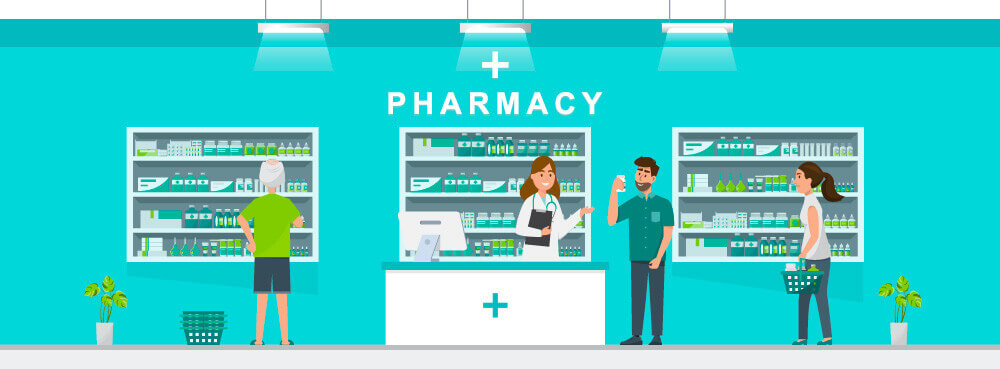Healthcare Waste Management Tips for Pharmacies

Pharmacies throughout Canada are required to follow specific guidelines when it comes to healthcare and pharmaceutical waste. These guidelines are mandated by federal and provincial or regional authorities and are set to protect the public and the environment from injury or illness caused by reckless medical waste disposal practices.
Throughout Canada, practice and regulatory standards are set by the National Association of Pharmacy Regulatory Authorities (NAPRA) as well as territorial pharmacy regulatory agencies, combined with the Canadian Forces Pharmacy Services. But what about pharmaceutical waste generated at a pharmacy, due to operation practices or patients returning unused or expired medications to the pharmacy location? Daniels Health can assist you in understanding how to dispose of expired medicine or unused pharmaceuticals.
In order to maintain compliance and reduce the risk of fines and penalties, but more importantly to protect citizens of Canada from exposure to potentially dangerous substances, pharmacies should always practice model standards of practice. The same applies to pharmaceutical waste management. Are you and your employees aware of the regulations surrounding proper disposal of medicinal waste in your region?
Clarity is key
When it comes to healthcare waste management tips for pharmacies throughout Canada, clarity is key. Based on definitions in provincial regulations, pharmaceutical waste can be any returned, unused, or expired medicine or medicine residue. Such medicines or residues are also included in the pharmaceutical waste stream if a container or vial is only partially empty. It also includes tablet and capsule medications, as well as broken ampoules or a pharmaceutical or medicinal residue in a syringe.
Hazardous and non-hazardous pharmaceutical waste should be properly disposed of. Both can be either completely dispensed or only partially dispensed. Canada’s three levels of government (federal, provincial/territorial/municipal) have regulations for pharmacies and other healthcare providers to not only protect the environment but to manage such waste streams.
Know your CEPA biomedical waste guidelines
Pharmacy managers and employees should be familiar with the Canadian Environmental Protection Act, 1999 (CEPA) as well as regulations regarding import, export, and interprovincial movement of hazardous waste and/or hazardous recyclable materials and their regulations.
Canada’s government website facilitates access to a guide that defines hazardous waste and hazardous recyclable material classifications and also valuable information found in appendices. The appendices provide clarity for healthcare waste management processes, which includes but is not limited to:
- Disposal operations for hazardous waste (Schedule 1 of the regulations)
- Recycling options for hazardous recyclable material (Schedule 2 of the regulations)
- Generic types of potentially hazardous wastes
- Constituents/characteristics of potentially hazardous wastes
- List of hazardous characteristics
Hazardous wastes and substances may include those that are either poisonous and/or infectious. For example, a substance that might cause harm to human health, or serious injury or death of it swallowed, inhaled, or comes into contact with the skin. It can also include wastes or substances that contain viable microorganisms or toxins that are known to cause a disease in humans or animals. In addition, these definitions can include any substance or waste that, if they penetrate the skin, are ingested, or inhaled, may cause delayed yet chronic effects including carcinogenicity.
Effects of medical waste on the environment & best practices
Pharmaceutical waste guidelines also focus on preventing potential damage to the environment. Such a waste or substance that can cause delayed or immediate adverse influences on the environment, especially through accumulation of such substances that can have a toxic effect on rivers, streams, soil, and any animals or wildlife that live in or around such areas.
Such substances may be produced by healthcare providers such as those found in hospitals, medical centres, laboratories, pharmacies, and research facilities.
Regulations of the Basal Convention and the OECD Decision C (2001) 107/Final is also a source of information and provides in appendix of core lists of waste streams controlled under these guidelines. They include but are not limited to:
- Wastes from the production and preparation of pharmaceutical products
- Waste pharmaceuticals, drugs, and medicines
Daniels knows it takes time to locate and read these guidelines, but doing so reduces the risk of problems caused by non-compliance.
Pharmaceutical Waste Disposal Regulations & Compliance
Pharmacies throughout Canada are responsible for taking adequate steps and precautions to protect people and the environment from hazardous pharmaceutical waste. Compliant pharmaceutical waste disposal services are essential, as are the steps toward achieving safe processes for doing so. Some of those processes include but are not limited to:
- Proper and safe preparation of hazardous pharmaceutical waste for shipment to disposal facilities
- Use of compliant medical waste disposal containers such as those for sharps or take-back drug programs
- Affixing appropriate hazardous labels and warnings on containers
- Compliant completion of hazardous waste manifests
You might also refer to the Institute for Safe Medication Practices Canada, which recently issued a safety bulletin regarding safe storage and disposal of medications, something which every pharmacist and employee should have knowledge about and be able to share with their patients. The guidelines are designed for both clinicians and patients regarding safe storage as well as disposal of medications within their community.
Among the essentials include compliant packaging and storage instructions for both home and clinical environments. For example, it is no longer acceptable to flush or pour unused drugs or pharmaceuticals in toilets, sinks, or sewer lines, due to its negative impact on the environment. The Health Products Stewardship Association (HPSA) provides a website with locations and processes involving safe medication disposal in every Canadian province. Pharmaceutical managers should be aware of such programs in their region.
Pharmaceutical Waste Collection Services
Are you aware that your pharmacy should be able to provide sharps collection containers to your patients free of charge? Is your pharmacy a collection site? In order to become a collection site, you must accept appropriate terms and conditions and fill out a registration form.
Do you know what goes into the containers? Access the Health Steward Canada website link for appropriate forms and location collection agreements for every province within the country. A number of acronyms and definitions are found in each provincial form including the definition of a medication return program acceptable containers (hard-shell plastic container and hard-shell lid with HPSA markings on the outside that is used as a receptacle for consumer health product waste returned by the public).
It is also acceptable to utilize the services and products provided by healthcare waste management providers such as Daniels Health as long as such containers and processes are compliant with federal and provincial guidelines.
Carefully read through the documents. For example, in British Columbia, the terms and conditions state that while some types of medicinal waste returned by members of the public is acceptable, medical sharps waste returned by members of the public is not acceptable. In Ontario, a sharps collection program (SCP) can receive SCP waste, meaning used medicinal sharps returned by the public, as long as they are stored inside approved sharps containers.
Yes, the guidelines and numerous sources of guidelines can be challenging to find and understand, but it is your responsibility to ensure compliance.
Read and understand the rules.
Daniels Health Resources throughout Canada
Daniels Health Canada provides cost-effective and compliant resources, products, and guidelines for pharmacies throughout Canada. Healthcare waste management regulations are effective in reducing injury and protecting the environment from improper disposal of pharmaceutical and medicine waste. For more information on our services, our products, and our sustainable solutions for pharmaceutical waste stream management and disposal, call us today.
When it comes to healthcare waste segregation and management, don’t take chances.
Call Daniels Health for help setting up a workable and safe healthcare waste management system.
Let's Talk!
Your time is valuable, and we don’t want to play hard to get. You can either phone us directly on the details listed on our contact page, or feel free to fill out this short form and one of our team members will get back to you as quickly as possible.
